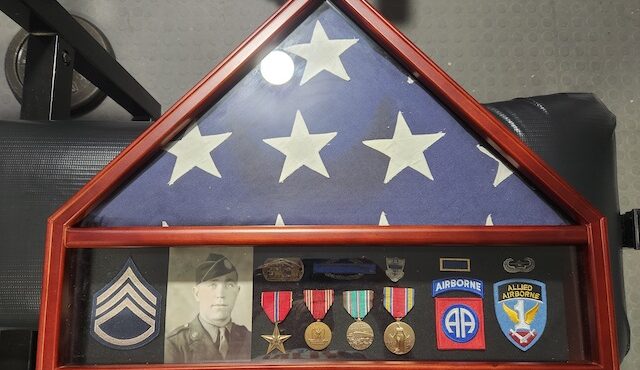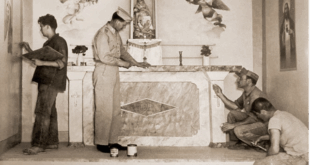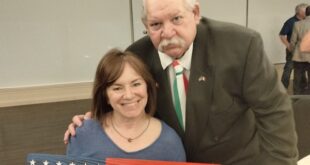Born in Italy, Daniel Donati first stormed the Boot then battled his way across Europe to help liberate the continent from Nazi oppression during World War II.
My father, Daniel (Adelmo) Donati, departed Genoa, Italy, with my grandmother aboard the SS Caserta and arrived at Ellis Island on Dec. 5, 1914. My grandfather was already in the U.S., and he sent for his family once he was established in an area outside Monongahela, Pennsylvania. When my father reached his teens, he was sent to Chicago for employment, where he lived with his cousin’s family.
Like many Italian immigrants, my father worked hard, starting out as a baker. He eventually transitioned to cooking, working at several Chicago restaurants. Some years later, he met my mother and they became engaged, but their marriage was postponed by the start of World War II.
My father was drafted after the attack on Pearl Harbor and became a member of the 82nd Airborne Division, 325th Glider Infantry Regiment (GIR). He was trained at Camp Claiborne, Louisiana, and Fort Bragg, North Carolina. Once training was completed, the division shipped out to the port of Casablanca on the North African coast. My father recalled that he knew he was entering a war zone because of the sunken ships in the harbor.
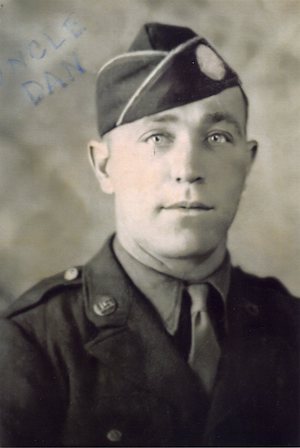 The 325th GIR’s first combat came on Sept. 15 after landing in Salerno, Italy. The unit arrived by landing craft with the mission of reenforcing an American unit on Monte Sant’Angelo di Cava. Once atop the 4,000-foot mountain, they were subjected to a massive German assault. Despite numerous German attacks, the 325th held their position. This is where the 325th suffered its first wartime casualties.
The 325th GIR’s first combat came on Sept. 15 after landing in Salerno, Italy. The unit arrived by landing craft with the mission of reenforcing an American unit on Monte Sant’Angelo di Cava. Once atop the 4,000-foot mountain, they were subjected to a massive German assault. Despite numerous German attacks, the 325th held their position. This is where the 325th suffered its first wartime casualties.
After the combat subsided, the division was transported to Naples for occupation duty. The Napolitani greeted them as heroes.
After combat in Italy, the division was sent to England for training. While there, my father encountered German V1 rockets, also known as “Buzz Bombs.” He said that if you could hear the motor, you were safe, because when the motor stopped the rocket would fall to Earth and explode.
Airborne paratroopers departed England the evening of June 5. Their mission was to land inland and prevent the Germans from attacking the Allied forces landing at the Normandy beaches. The 325th GIR landed in Normandy on the morning of June 7, the day after D-Day. During the approach to the landing zones, the thinly sided gliders fielded heavy anti-aircraft fire, and potential landing zones were flooded or filled with deadly obstacles.
After their initial mission, the 325th received orders to seize ground near Eteinville. This is the area in which my father was awarded the Bronze Star. The citation noted that he voluntarily relieved a wounded ammunition bearer without orders and carried ammunition to the mortar position through a heavy artillery barrage. When asked about the incident, my father said that he did what everyone else was doing.
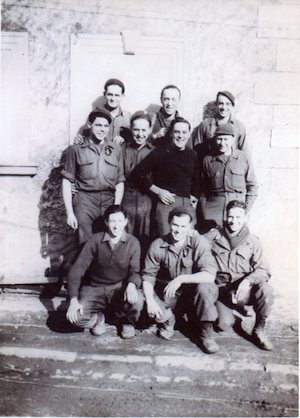 Operation Market Garden was an ambitious plan that involved securing key bridges and gaining access to strategic Belgian ports. The 82nd Airborne Division played a critical role in the largest airborne operation of World War II. On Sept. 17, three parachute infantry regiments (PIRs) of the 82nd jumped and landed in predetermined locations. Delayed by bad weather, the 325th GIR landed among German positions six days later, beating back attacks on the troops already in position, turning the tide of the battle and earning a Distinguished Unit Citation. At the start, the Allied forces, which included British and Polish airborne troops, captured several bridges, but the operation failed in its ultimate objective of crossing the Rhine River. The 325th stayed in place, engaging in skirmishes until they were removed along with the rest of the 82nd to rest and re-supply.
Operation Market Garden was an ambitious plan that involved securing key bridges and gaining access to strategic Belgian ports. The 82nd Airborne Division played a critical role in the largest airborne operation of World War II. On Sept. 17, three parachute infantry regiments (PIRs) of the 82nd jumped and landed in predetermined locations. Delayed by bad weather, the 325th GIR landed among German positions six days later, beating back attacks on the troops already in position, turning the tide of the battle and earning a Distinguished Unit Citation. At the start, the Allied forces, which included British and Polish airborne troops, captured several bridges, but the operation failed in its ultimate objective of crossing the Rhine River. The 325th stayed in place, engaging in skirmishes until they were removed along with the rest of the 82nd to rest and re-supply.
On Dec. 17, the Germans were on the move in Belgium and had breached the American frontlines. American units were deployed to halt the German advance. The 82nd was sent to the village of Werbomont and the 325th dug in near the crossroads at Baraque de Fraiture. On Dec. 22 and 23, the 325th took part in some of the fiercest combat of the battle, facing an all-out attack by the German 2nd SS Panzer Division. The troops also endured brutal weather conditions, with the fighting taking place during one of the coldest winters on record. The American forces held and eventually the cloudy skies cleared, enabling superior Allied airpower to decimate the German armored columns.
The Battle of the Bulge was the bloodiest confrontation of World War II for U.S. forces, with more than 80,000 casualties. My father believed that the German offensive had little chance of success and it was a tremendous waste of lives.
Afterward, the Allies continued the drive into Germany. The fighting ahead was some of the fiercest of the war, with the Germans defending their homeland.
On May 2, 1945, the 82nd Airborne Division made a horrific discovery near the German village of Ludwigslust, where they came upon the Wöbbelin concentration camp. The men who entered the camp were shocked by the nightmarish state of the prisoners. Many were dead and the living were in extremely poor condition. The soldiers sprang into action, delivering food and providing first aid to the sick, but for many it was already too late.
I remember my father saying that the prisoners in the camp were afraid of anyone in uniform, but they soon recognized the Americans as liberators. My father became angry when he recalled the conditions in the camp, and he stressed that the residents in the nearby German town were forced to march through it and witness the war crimes that were committed there.
The war in Europe ended on May 8 with the unconditional surrender of Germany. The 82nd Airborne Division was selected to occupy Berlin, but by that time my father had enough combat time and was headed home.
Staff Sergeant Daniel Donati returned from the war and resumed civilian life, opening a restaurant, getting married and starting a family. He was a humble man, quietly living his life, devoted to work and family. Our family lived a normal working-class life but eventually I discovered his military uniform and decorations. Even at an early age, I realized the importance of the items and I would ask him questions about his experience.
When my father spoke about his military service, he made it clear that he was proud to have served with the legendary 82nd Airborne Division. He fondly recalled the bonds that could only be formed through the hardships of military service. He rarely spoke about his combat experiences, but when he did, he spoke vaguely, and I sensed a deep reservoir of emotion.
As I grew older, I started to research my father’s military service and I slowly began to realize that the war changed my father in ways I will never fully comprehend. The stark cruelty of war can be truly understood only by the individuals who lived through it. My father passed away in 1987, and although he never regarded himself as a hero, he will always be a hero to me.
The above appears in the January 2024 issue of the print version of Fra Noi. Our gorgeous, monthly magazine contains a veritable feast of news and views, profiles and features, entertainment and culture. To subscribe, click here.
 Fra Noi Embrace Your Inner Italian
Fra Noi Embrace Your Inner Italian


